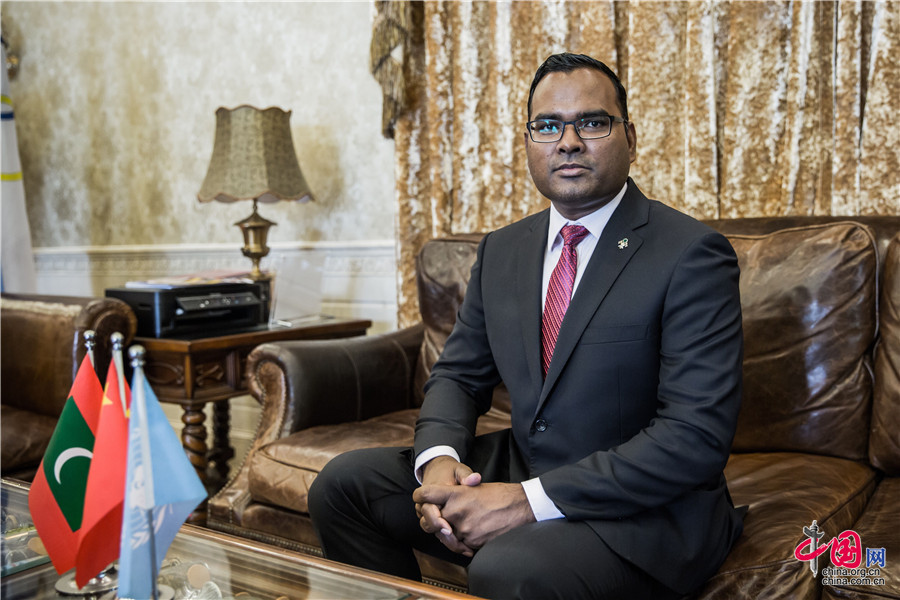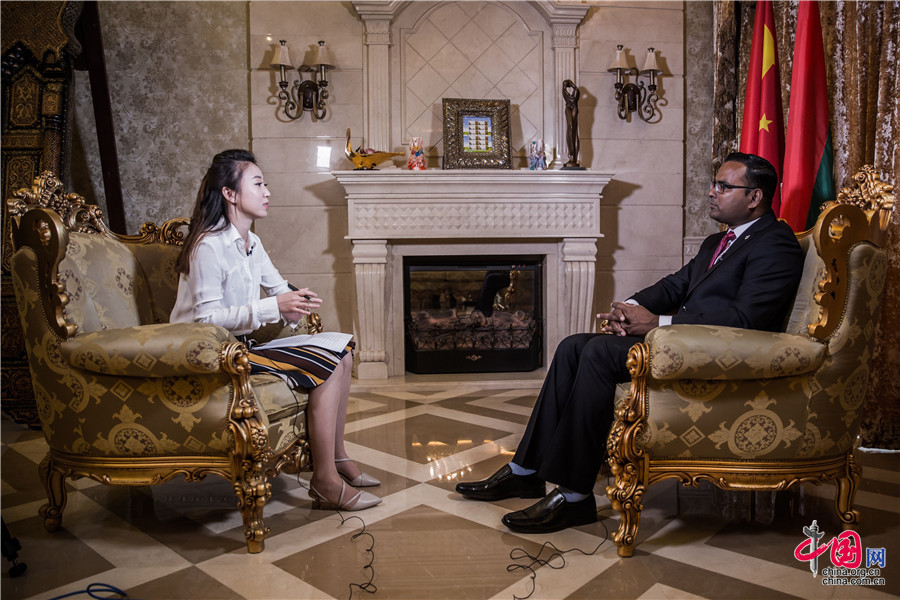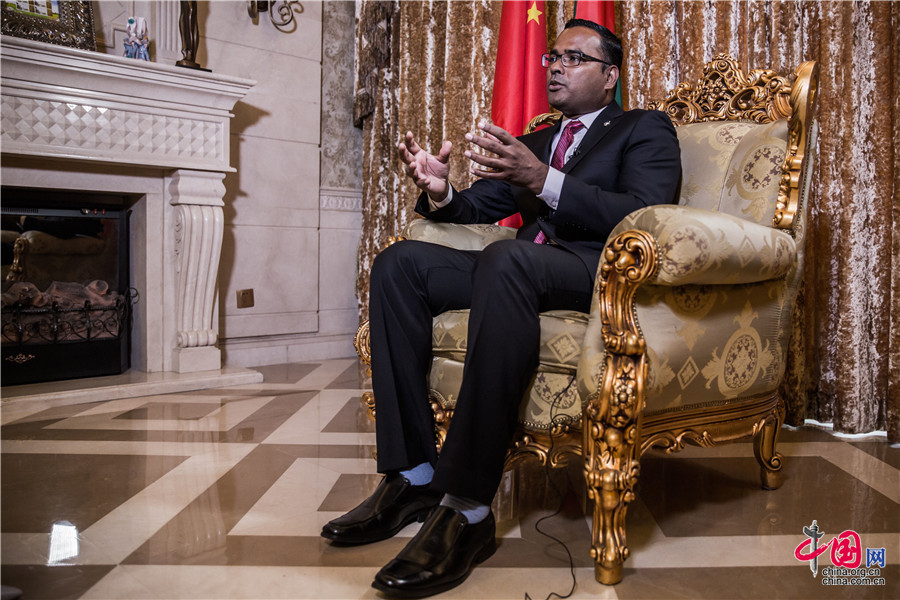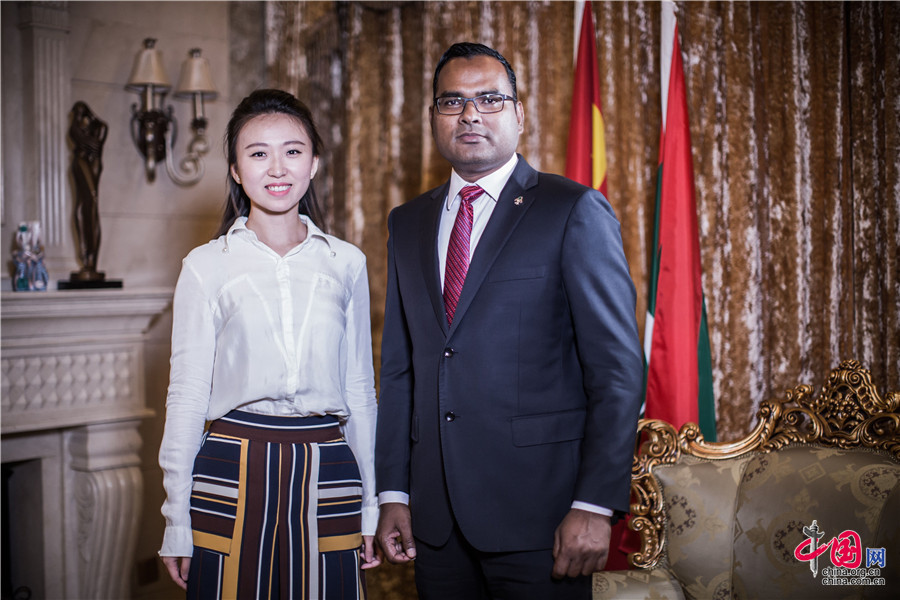Maldives provide all their support to the Belt and Road Initiative
- Liu Mengya
 0 Comment(s)
0 Comment(s) Print
Print E-mail China.org.cn/Chinagate.cn, May 15, 2017
E-mail China.org.cn/Chinagate.cn, May 15, 2017

Hello, welcome to China Talk. With the Belt and Road Forum for International Cooperation (BRF) being held in Beijing on May 14-15, we are honored to have Mr. Mohamed Faisal, the Maldives ambassador to China, to talk about the opportunities brought by the Belt and Road Initiative to Maldives’s economic development and also to the cooperation between China and Maldives.
China.org.cn:
Mr. Ambassador, it is my great honor to have this conversation with you. Maldives is one of the first countries who actively responded to the Belt and Road Initiative. Why is Maldives so interested in this initiative from the very beginning?
Mr. Ambassador:
You are right. We are one of the first countries in South Asia to join the Belt and Road Initiative in December 2014. We signed a MOU with the Chinese government to jointly build the 21st Century Maritime Silk Road. I think why we did it is because we are also a part of the ancient Silk Road, especially the spice road. Maldives is in a very strategic position in the India Ocean. We have been a trading post; we have had a lot of travelers in the past. Even travelers from China when they got a trade from China to Africa. They used to stop in Maldives to sell their products and also to replenish their boats and things like that. So we have been a very active part of this Silk Road for a very long time. And coming back to the present, we feel that the Belt and Road Initiative is a very important initiative. At a time when the world is going through a lot of changes. We have gone through the millennium development goals. We have gone through a lot of other development initiatives from the past. Multilateral initiatives. Now the world needs the regional initiative that can be used regardless of the size of the country. So that’s the reason we joined the Belt and Road. We think that the Belt and Road is not for specific countries. Big countries, small countries, we can all join together. We can all benefit from the Belt and Road. For the Maldives government, it is a very important initiative. We feel that it will enable not only the regional development, but also the global development. It can also create opportunities for small countries like Maldives to play a larger role in the initiative. Especially in the fields of the commercial diplomacy as well. So there are many reasons why we feel it is important and we, as you rightfully said, we support the Belt and Road Initiative all heartedly.
China.org.cn:
So that’s why this initiative has gained so many achievements in such a short time, right? It’s only been three years since President Xi Jinping proposed the Belt and Road Initiative.
Mr. Ambassador:
Yes. I think the timing is very right for an initiative such as this. Now, after recent changes, political changes in many countries. We are going through a period when we are questioning the importance of free trade. We are talking about closing our borders to create protectionist barriers. I think the global economy has gained very much in the past decade due to open trade, open borders. I think it’s very important that we keep this momentum. Of course globalization has had some negative impacts. We can’t deny it. But globalization has been beneficial for many people. So I think it is not the time to roll back the globalization, and the initiatives such as the Belt and Road can help to bring a new dimension to globalization and to bring in more people, whether rich or poor, bring more people into global development. I think that is the basic thing that we are looking for in the Belt and Road.

China.org.cn:
Over the past 10 years, Maldives’ economic growth has gone through great fluctuation, because of the global financial crisis and some natural disasters maybe. What is the main problem facing Maldives’s economic development that needs to be solved right now?
Mr. Ambassador:
The Maldives’ economy is very one-dimensional. Before tourism was introduced in 1972, our economy was based on fishing. Fishing was our main economic activity. But in 1972, we started tourism. Since then, tourism has taken over. It is the top economic activity in the country. The problem with that is as you rightfully said, with tourism, we are at the mercy of international markets. We are at the mercy of what’s going on in the global economy. Whenever there is a crisis, economic crisis, or a health crisis, such as SARS, our tourism suffers a lot. People stop coming and there is difficulty in filling up our beds. So it is a very difficult situation. The Maldives government right now is looking at how we can diversify, because tourism alone cannot sustain. Although we have a very small population, our dreams are very big. In order to achieve our dreams, we need to diversify our economy. Especially since our President Yameen Abdul Gayoom came into power in 2013. We are going through an economy transformation program. He came with a manifesto that calls for transformation for our economy. We need to diversify into other areas -- manufacturing, service industry, financial industry. So that’s what we are trying to do. For us, if we don’t diversify our economy, we will always be at the mercy of international market movements. Whenever there’s something happening in Europe, we will suffer, our economy will suffer. Our tourism will suffer. So that’s the reason we are looking at diversifying our economy. And as long as we continue our economy as it is now, we will face more challenges in the future. So we want to proactively find a way to overcome these challenges and to find a way that we can sustain our development. So we can deliver more benefits for our people.
China.org.cn:
How is the Belt and Road Initiative gonna help with that, the diversity of economy or the economic transformation?
Mr. Ambassador:
I think the one thing that we are looking through the Belt and Road is investment finance for some of our projects. Already, Maldives is also one of the founding members of AIIB. So through the bank and other mechanisms like the Silk Road Fund, we are looking at opportunities of financing some of our big infrastructure development projects. So that is how we are looking the Belt and Road as a mechanism that we can use in our economic transformation project.
When we are talking about transforming our economy, we are looking at many drastic changes. For example, we don’t have any manufacturing. We don’t have huge ports and other such infrastructure.
So we need funds. We need finance. We also need know-how and technology. I think through the Belt and Road, through China, and through other countries that are part of the Belt and Road, we will be able to get the finance, get the know-how, get the technology. So all these things are very important to our economy transformation. That’s why we are looking at the Belt and Road for us to be a part of the Belt and Road and then get the opportunities through the Belt and Road for this transformation project.
China.org.cn:
So it is not about China and Maldives only. It’s also about other cooperation between Maldives and other countries.
Mr. Ambassador:
Of course. Through the Belt and Road. The Belt and Road is not just a single line of countries. It’s many connections. So all the countries along the Belt and Road, and even those not along the Belt and Road. We are creating connectivity between all these countries. We are not only linking politically but also linking these countries economically. People to people contacts, technology transfer, all these connections. It’s up to the individual countries to see which connections they will be using. For example, for one country, maybe people to people connections are important. For others, maybe technology connections are important. For others, the finance connections maybe important. It’s up to the individual countries to seek for the benefits of the Belt and Road. And of course Maldives will be also doing the same. We will be looking at which countries can offer us finance, which countries can offer us technologies. That’s how we are going to approach the Belt and Road.
China.org.cn:
Let’s talk about China-Maldives cooperation under the framework of the Belt and Road Initiative. We know that China has begun helping Maldives building the cross-sea bridge, which connects Male and the Airport Island, which is called China Maldives Friendship Bridge. I think it is a representative project of the two countries’ cooperation in infrastructure construction. Why is this bridge taken as Maldives’ century project?
Mr. Ambassador:
I think the bridge represent the next stage of development we want to go. If you know geography of Maldives, Male, the capital is very congested, is very crowded. In Male, more than half of our total population is living in Male. We need to find a way to ease the (overcrowd) condition in Male and to create a development center in the Male area. Naturally, we have the airport next to it, and next to the airport, we have a new city that has been developed. The bridge will link Male to the airport and to the new city. So it will help to take some people out of Male, help the (overcrowd) condition problem. It will also create a connectivity between Male and airport and new city. So in that respect it is very important. It’s also a social product as well. Because once we are able to reduce the (overcrowd) condition in Male, we will also help reduce a lot of social problems in Male. And you ask me why it is an important project between China and Maldives. I think it is the most (important project), since we established diplomacy relations in October 1972. Since then we’ve been having the open cooperation with China. One of the earliest of which is in social housing projects in the early 1980s. But since President Xi Jinping visited Maldives in 2014, our relationship has gone through sea change. I always describe the relationship between Maldives and China as before Xi Jinping’s visit and after Xi Jinping’s visit. Since then, our relationship is now at an all time high. And I think this bridge represents the new relationship of win-win cooperation between the two countries. That is why it is so important. That is why it is so aptly named China Maldives Friendship Bridge. I think once the bridge is finished, people both in Maldives and China can see how two countries can cooperate. If you see Maldives, the smallest country in the world, and China, one of the biggest countries in the world. We are cooperating because we know there are win-win opportunities for both countries. And that’s what the bridge represents.

China.org.cn:
The 5th Round of China-Maldives FTA Negotiations was held in March. What achievements have been made?
Mr. Ambassador:
We are happy to say that we have concluded all the initial negotiations. We have had five rounds, and right now what we need to do is we have to go through some domestic processes, legal scrubbing of the document and once the two governments agree on the text of the FTA, we will be ready to sign. We are hopeful we are able to sign the FTA in the second part of this year. This FTA is also very important, both as a reflection of the relationship between the two countries and also for the Maldives’ economy. By signing this, we will be showing the world that both small countries and big countries can cooperate, no matter the size of the economy. If you look at the economic sizes of the both countries, it is very imbalanced. Maldives is very small economy and China is one of the biggest economies in the world. But we are able to come together and we are able to find mutually beneficial win-win situation in commerce and trade. That’s why we agree to go to this FTA. Both parties have been very forthcoming and very supportive in concluding this FTA at the early stage. It’s only been two years since it’s started discussion and now we have the stage that we can sit down and finalize the document and sign it. It is going to create an important impetus for economic development especially for Maldives’ small business and Maldives’ commercial entities because we will be getting market access to a big country like China. And for the Chinese also, although Maldives is a small country. We are in a position where they can get access to the South Asian market through the Maldives. Once you open the Maldives market, you can access the South Asian market. There are many beneficial opportunities to both sides by signing this FTA.
China.org.cn:
What will be key aspects or areas in the two countries’ future economic cooperation?
Mr. Ambassador:
Maldives’ export business is not very big. Our main export is fish and then we have the services, tourism and constructions, etc. For Maldives, the most benefit we are looking for is to export fish product into China . And also for the Chinese, you have many products and many goods. The trade between our two countries is expanding. Last year, the trade value was around $300 million between our two countries, and it keeps growing every year.
For Chinese, there are many opportunities for infrastructure investment, to import products and also to seek markets in the South Asian through Maldives. We are also looking at financial services, travel and leisure services. Maldives tourism economic is one of the biggest and most profitable tourism industry in the whole world. So Chinese companies, Chinese enterprises will have access to those as well. So this FTA covers both commodity and also services and there are many opportunities for the Chinese commercial enterprises through the FTA and also for the Maldives enterprises.
China.org.cn:
Besides the economic cooperation, we believe that the Belt and Road Initiative is also about people to people exchanges. It’s about changing people’s lives. How do Maldivian people feel about this initiative?
Mr. Ambassador:
I think the people to people exchange, cultural exchange and culture contact is a very important part of the Belt and Road. When people meet, it creates harmony, it creates trust. When you trade, it’s just goods, money exchange. But when people meet, it creates trust and understanding between people. And that is the most important aspects of the component of the Belt and Road. Due to tourism, Maldivians and Chinese have been coming closer. China is our biggest tourism market, close to 30 percent of all the visitors come from China. Chinese people know Maldives very well, so it makes my job also very easy because wherever I go to China, they know Maldives. That connection between has been created through our tourism and with the Belt and Road, we have more opportunities. As I speak right now, we have a group of five Maldivian artists in China right now. They will be here for an exchange program. They will be working together with Chinese artists. They will be able to know about Chinese culture. Chinese artists will know about Maldivian artists’ tradition. There are the kinds of opportunities that have been created. We are looking forward to more of these opportunities in the future.
China.org.cn:
Speaking of tourism, will Maldives and China have more cooperation in this field in the future?
Mr. Ambassador:
Of course will. Now there are already some Chinese private investors are investing in the tourism sector as well. Maldives tourism initially was very European oriented. But since the Chinese started coming in, since the Chinese have become the big chunk of the arrivals over the past six, seven years, we have changed our tourism products as well to suit the Chinese market. Now the Chinese people, Chinese enterprises also know the value of this, now a lot of Chinese are investing in the tourism industry. We are also looking at increasing the air links between Chinese cities and Male. Because as you know, the most important thing if you want to have a sustainable tourism industry is to get people. We already have Maldivian flights fly to Chinese cities, but we are looking at more air links between Chinese cities and Male. So once our tourism product increases, the number of our visitors can also increase. Also we are having this huge project of the airport, which is also been done with the assistance of Chinese government. Once the airport is developed, once we have new resorts, we are anticipating, 15 new resorts in the next couple of years. We need more travelers from China to come to Male. We expect 1 million each year from China. I think it’s an achievable target. For that, we need more airlines from China to Maldives. The Maldives government is very ready to assist these airlines to come in to Maldives to bring these new visitors to Maldives every year.

China.org.cn:
China.org.cn is launching its Belt and Road Initiative website with both Chinese and English version. It would be a great honor for us if you address a few words in support of China.org.cn and the new website.
Mr. Ambassador:
Wish China.org.cn all the best. I think it’s very important for NGOs, for the media and for others to be an active part of the Belt and Road Initiative. Because you can’t just leave it to the government to promote the Belt and Road. I think the organizations, media, journalists, NGOs, they have an important role not only to tell people about the Belt and Road but also to find the opportunities through the Belt and Road. You can have cooperation with journalists, media from other countries as well. I wish China.org.cn all the best. I’m sure your website and news agency will play a huge part in the promotion of the Belt and Road and in telling people the opportunities that are available through the Belt and Road. The Maldives embassy in China and the Maldives government remain committed to be a part of the Belt and Road. We will provide all our support to make this a very successful initiative for the world. Thank you very much.
(Host: Sun Wanlu; Writing: Liu Mengya; Filming: Liu Zhe, Liu Kai; Post production: Liu Kai; Photo: Zheng Liang; Planning: Wang Donghai)


